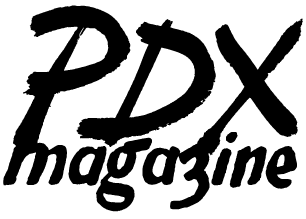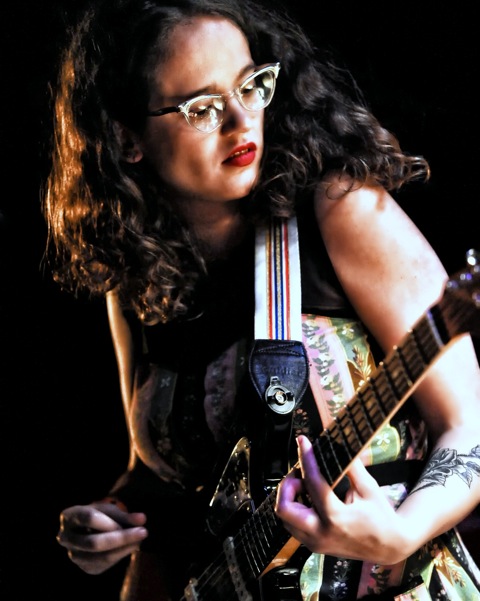Parting ways with the Sound Outside and joining forces with her new all-female band, Ford has taken a much more aggressive and pop rock-infused direction. ‘In this band, there’s just one guitar, and that’s me,’ Sallie says.
By Jef Krohn
Above photograph by Miri Stebivka
Video by Stephanie Michelle Neil
The most curious and irrelevant fact about musician Sallie Ford is that she is not a high diver. Despite what her shoulder tattoo may suggest, Ford has never climbed the numerous rungs of a very tall ladder, stepped out to the very edge of a lightly bouncing diving board, only to take a graceful plunge into the water far, far below. Ford simply liked the classic art deco look of a female high diver at the peak of her jump, mid-toe touch, and decided to get it permanently etched into her skin. You learn quickly that looks deceive with Ford, who transcends labels and sounds.
Since 2007, Sallie Ford has brought her retro-rockin’ 1950s Motown-era-surfer-swagger to Portland venues and beyond. Ford, with her band the Sound Outside, made stops at the Late Show with David Letterman, Bonnaroo Music Festival, the Newport Folk Fest, and many others. Ford gained national recognition for her classic and clean Fender guitar licks coupled with her soulful, vintage rhythm-and-blues vibe. These sounds were complemented by her deceptively smooth vocals mixed with a somewhat sloppy breathing technique (Ford leaves her diaphragm clinched after each stanza, forcing a strained breath to linger at the end of each lovely lyric.). This has divided her sound into two distinct categories: You like it or you fucking love it.
Yet Ford has taken the age-honored leap of transformation and transition. Parting ways with the Sound Outside and joining forces with her new all-female band, Ford has traded in the poodle skirts and pom-poms for a buzz peddle and Moog synthesizer, redefining her sound in the process.
Formed roughly six years ago in Portland, Sallie Ford and the Sound Outside challenged the term rockabilly from the outset. With no upright bass or slicked-back greaser hairstyle, the band hardly fits the rockabilly mold—at least at first glance. “At first it was very deliberate,” explains Ford. “I wanted that classic blues sound of Billie Holiday and Ella Fitzgerald—I just loved that feminine sound—but eventually I started listening to other influences and wanted to expand.” By mixing the classic rhythm and blues feel with Ford’s consuming influence of vintage rock ‘n’ roll, the group naturally began to flirt dangerously close to the rockabilly label. That’s something that doesn’t sit well with Ford. “I hate the rockabilly title. Anyone who knows rockabilly knows that’s not us…yet it never fails that, at every show, people show up looking for the upright bass.” While the instruments and outfits don’t scream rockabilly, perhaps the term follows the band because their sound seems to be heavily influenced by it. Or at least it did.
Sallie Ford and the Sound Outside ‘s demise in December of 2013 is generally considered a mutual conquest of individual ambitions. Each parting member had been secretly longing to leave the successful institution that established their names in order to pursue their own individual, ostensibly smaller-scale interests. One can’t help but wonder why— at the peak of their fame, after a successful tour, and as their new album was reaching new heights—they would choose to suddenly discard everything they had worked so hard to achieve in order to restore some old bikes, solve Good Will Hunting math problems, and get back in touch with dive bar gigs, respectively. In fact everyone but Ford herself seems to have disappeared back into virtual obscurity.
“It really wasn’t that sudden,” reflects Ford, of the band’s break-up. “We started talking about it last summer as just ‘taking a break,’ but then I kind of found the ladies that I’m playing with now, which was going to be just a side project. I think we had been at it for so long and [although] we had done so many things right, I think it was so hard for such a long time that we all just wanted a break and to try something new.” While astonishing, it is understandable that after six years of shows, albums, and tours, gaining national recognition and success (albeit on a small scale, relatively speaking), Tyler Tomfelt, Jeffrey Munger, and Mr. Ford Tennis were all clamoring to go their own ways. Time will tell how the Sound Outside members redefine themselves—individually.
Now distanced from her humble rockabilly-sounding-but-not-actually-rockabilly roots, Ford takes a drastic musical turn with her new all-female ensemble. In Ford’s new act Cristina Cano plays keyboards, Amanda Spring sits behind the kit, and Anita Lee Elliot plays bass. Ford now plummets deep into the electronically infused buzz-pop bowels of early 1970s retro rock rhythms of synthesized surfer doo-wop. Revolting against expectations based on her previous musical endeavors, Ford has taken a much more aggressive and pop rock-infused direction. “In this band, there’s just one guitar, and that’s me,” Sallie says. “I’ve tried to step out front and do more. Also, there’s keyboards.”
Ford was less than excited about adding keyboards to the band in the beginning. However, under the tutelage of her producer, The Decemberists’ Chris Funk, it has now become the major distinction between this and her last band. “At first,” Ford says, “I just wanted the keyboards to cover, like, 1960s organ sounds, but Chris had this idea of doing more of a synthesized sound, which makes the songs sound a little different.”
Of course it’s never a sure thing, when artists redefine themselves. When audiences feel connected to a performer, it can feel like a loss—even a betrayal—when the performance changes. But Ford has resisted definition from the beginning and hopes her audience will see through the changes. “[At the core], it’s still my voice and my songs,” she says. “I’m hoping people will still follow it and like it.”


